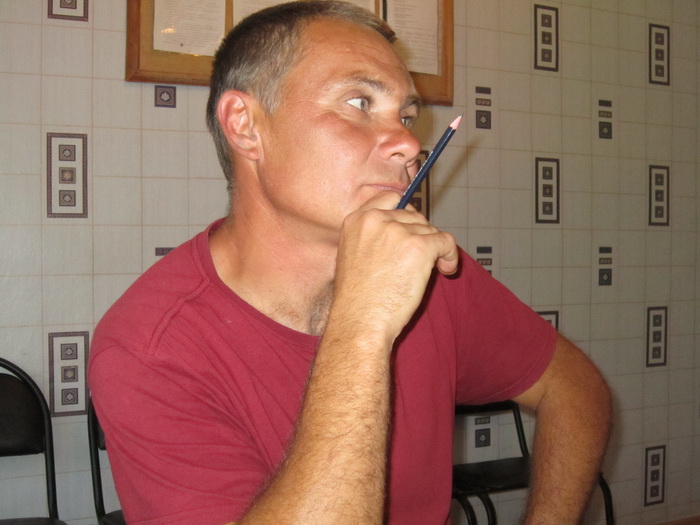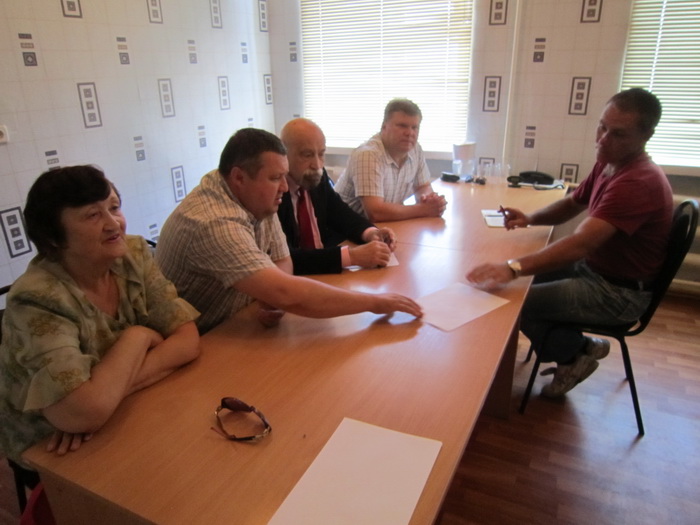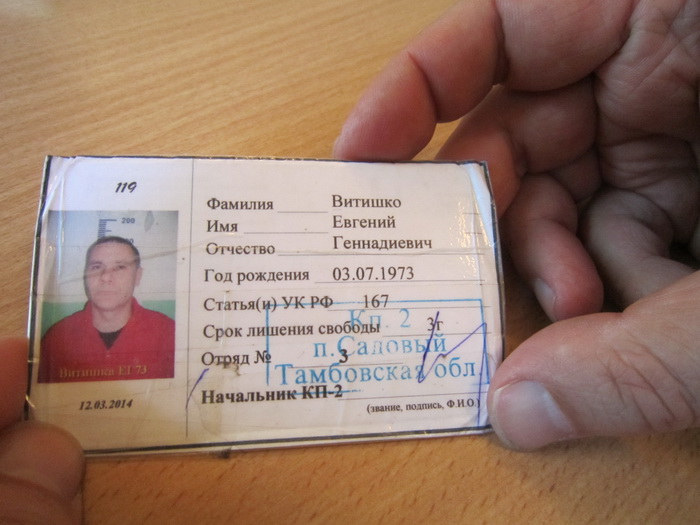A true Hero of Russia
Sergei Mitrokhin’s blog at the Ekho Moskvi web-site, 03.07.2014
Today is the birthday of Yevgeny Vitishko.
If our country was headed by a true patriot, he would have definitely awarded Yevgeny Vitishko with the ‘Hero of Russia’ Star. However, then Vitishko would not have been in a penal colony, and thus part of his heroic deed would not have been done.
[Governor] Alexander Tkachyov agrees that he is a thief
But let me remind you how Vitishko got into a penal colony.
On the 13th of November, 2011, Yevgeny with a group of activists participated in the public inspection of the so-called “Governor Tkachyov’s country cottage”. The territory of the cottage represents a fenced area of 10 hectares near the village Dzhubga in Blue Bay of the Black Sea. From the forest the cottage site is fenced with a metal fence which closer to the sea is replaced by a concrete fence. Environmentalists drew public attention to the fact that the fencing [the coast] violated the provisions of the Forest and the Water Code stipulating that citizens should have free access to forest lands and foreshore. During this inspection the following graffiti were made on the fence: “Alexander is a thief”, “Forest is for all people” and “Tkachyov, go away, you are a thief”.
In spite of the fact that Vitishko did not do these graffiti, he was detained and arrested for ten days on the charges of “disobeying lawful orders of the police”.
In December 2011, Yevgeny Vitishko and Suren Gazaryan became defendants in a criminal case filed against them under Article 167 of the Criminal Code “Deliberate destruction or damage of property”, rather than defamation or slander. The case was damage to property! So it is not very clear: whether Governor Tkachyov agreed that he was a thief or illegal property was dearer to him than his honor and dignity?
Two years ago, in 2012, Vitishko and Gazarian were sentenced to three years imprisonment with two years probation.
The FSB (Federal Security Service) put them under surveillance so that to detect violations of the regime by them. Their phones were tapped. In December 2012, the court made a decision toughening their regime: Vitishko was forbidden to travel outside the Tuapse district without notifying the Penitentiary Inspection and was ordered to come to the inspection twice a month. After that Vitishko got several warnings about his violation of the regime.
International human rights organisation Human Rights Watch made a statement in defence of Vitishko.
In November 2013 the Penitentiary Inspection UFSIN in the Krasnodar Territory issued another warning to Vitishko which resulted in a motion by the Tuapse branch of the Inspection demanding from court to replace probation for Vitishko by a real imprisonment term. The trial was scheduled for November 28, 2013, but postponed to December 19, 2013.
By this time, Deputy Chairman of the Supreme Court decided to review the case of the “damage to the fence” and return it for a new trial. The Supreme Court made it clear that the verdict had been absurd and should be abrogated.
However, this did not happen. The Krasnodar Regional Court not only refused to review the case, but decided to replace probation for Vitishko by a real term in a penal settlement colony for the “systematic violation of the regime of restrictions”.
The Prisoner of the Olympics
Such unbridled cruelty of the Krasnodar Court was certainly caused by the activism of environmentalist Yevgeny Vitishko in denouncing [Governor] Tkachyov and his minions in multiple environmental crimes. Another motive behind keeping environmentalists behind bars were the coming Sochi Olympic Games, and preparations for the Olympics caused catastrophic damage to the nature of the Black Sea coast.
Therefore, it was very symbolic that during the Olympics, on February 12, 2014, the Krasnodar Regional Court rejected an appeal about replacement of probation by a real imprisonment term, after which the decision on putting Vitishko to a penal colony for three years came into force.
So, Yevgeny Vitishko can be called the prisoner of the Olympics.
I came to the penal colony with Valery Borschev, human rights activist and member of YABLOKO’s Political Committee, and my advisor Sophia Rusova. In addition to YABLOKO members, Alexandra Pavlikova, Chair of the Public Monitoring Commission in the Tambov region, and Lidia Rybina, human rights activist and member of the Public Monitoring Commission, were present at the meeting with Vitishko.
Yevgeny was escorted to the meeting with us and we were told that we could communicate up to four hours. Before that we had sent him a parcel: food-stuffs and magazines and newspapers. Before a parcel is handed to a prisoner it is tested for “extremism”. For four hours we tore Yevgeny from the main thing in the colony – forced labor.

Attractive Labour
Article 37 of the Constitution solemnly prohibits forced labor in Russia. But the Criminal Code spits on the Constitution. Article 53.1 of the Criminal Code is entitled simply and clearly: “Forced Labour”. The Penal Code does not use the word “forced”, but it obliges (Article 103) to “attract” convicts to labour (i.e., in violation of the Constitution).
However, despite this labour turns out to be “attractive”, its essence does not change:
Tambov Penal Colony No 2 is virtually an agricultural slave plantation.
Refusal to work is perceived here as the veneration of the Constitution in a particularly malignant form and may result in the relocation from the penal settlement to a penal colony of a general regime.
The whole life of a prisoner is subject to strict internal regulations (issued in 2005) evolving around the forced labor. According to environmentalist, in almost ten years, these regulations became outdated and need revision.
In the settlement colony it is allowed to wear ordinary personal clothes, but a prisoner can get a reprimand for an “unkempt” look. Vitishko got a reprimand for being in bed at the wrong time.
Article 129 of the Penal Code envisages that convicts in penal settlement colonies have the right to meetings without restrictions of their number. But members of the Public Monitoring Commission of the Tambov region said their requests for a meeting with Vitishko had been repeatedly turned down, local journalists had been trying to see Vitishko for several months, though he would have been glad to talk to the press.
There are two telephone boxes in the settlement colony: a convict can make calls in accordance with a schedule, but only two hours of time for telephone conversation is envisaged for all the 600 convicts of the colony per day.
We talked about politics. Yevgeny said he would like to take part in the elections of the Mayor of Sochi. If he had been free, he would have certainly run for the post.

The colony chief told us that over 90 per cent of all the prisoners requesting parole had been released. Vitishko has the right to parole without acknowledging “his guilt” in February 2015. If a convicted person does not have any penalties or reprimands and has not violate the rules, the colony can appeal for his parole.
The most loud recent incident in the colony was a massive search of 30 convicts who had refused to participate in the “attractive” labour. To settle this, the heads of the Federal Penitentiary Service Department (UFSIN) in the Tambov region sent to the Colony No 2 as many as 70 (!) of their staff from other colonies. As Vitishko told us, convicts were massively beaten with truncheons during the search. He forwarded a letter on that to the Public Prosecutor: “On May 20 at 11.45, I witnessed a criminal offense, namely, mass beatings of the convicted by the UFSIN staff. On this day a search took place in KP-2, and employees of different penal institutions of the Tambov region were involved in it. During this event, part of the employees, of which there were no employees of KP-2, were beating the convicts using special devices in the territory by the punitive isolation ward, thus driving them into the isolation ward. Further, we found out that these prisoners were in the quarantine unit KP-2 and refused to clean the premises of the quarantine department. In addition, according to the convicts, the citizens who were in the moment in the isolation ward were also beaten.”
An “MP” from neoGULAG
The environmentalist said that on June 4 after his short meeting with his friends, all the telephone boxes in the colony stopped functioning. According to the prisoners, acting chief of the colony Major Vlasov and head of the operative part Major Saprunov accused Vitishko of the damage. They told to the prisoners that Vitishko “broke the phoned with his tongue”. In addition, the heads of the penal institution did not allow several prisoners to visit a shop and also accused Vitishko in that.
But people certainly believe Vitishko and not the sly guards. He won a huge moral authority with his ability to keep himself among the convicts and the refusal to cave in to the authorities. While being in the colony he wrote 38 appeals on various reasons, not relating to him. In colony he is called and “MP” for his legal assistance and prompt response to all manifestations of lawlessness.
For me personally, such an MP is worth the present 450 MPs of the State Duma …

Yevgeny really wants to publish a book describing his experience of imprisonment and giving his view what needs to be changed in the penal system, as well as telling the story of his absurd conviction and about 40 poems. I think that all Yevgeny’s friends will join their efforts and the book will reaches the reader very soon.
At present a worldwide campaign to support the environmentalist has been launched: postcards come from South Africa, Finland and Germany. Recently Greenpeace activists have brought him 500 letters. Unfortunately, Yevgeny simply does not have time to answer all the letters.
Today we are sending our heartiest congratulations to Yevgeny on his birthday and wait for his return!
And all those who have not seen him for a long time – please watch the video with Yevney from the colony. This interview was erased by the UFSIN staff who tore the camera from Sophia Rusova, but our experts managed to restore the recording.
Yevgeny Vitishko had an opportunity to leave Russia in order to avoid all these ‘delights’ of the modern GULAG. No one would have dared to condemn him for it, as no one condemns Suren Gazaryan [who left Russia] today, and many people even praise him for taking the opportunity.
Answering my question why he had not done it, Vitishko said, “I believe that it would have been a manifestation of inconsistency. Let those who have been destroying our country, run from it, and I, on the contrary, am saving the country from them. And I have to be here, whatever this may cost me. I was even lucky to some extent: I got a chance to prove that we can fight against the system even in the place where it tries to destroy you”.
That is why I think that Yevgeny Vitishko is a real hero of Russia.
Posted: July 8th, 2014 under Evgeny Vitishko case, Human Rights, Protection of Environment.






